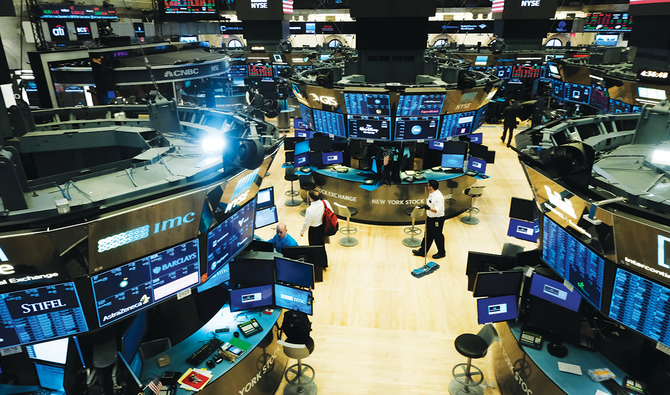WASHINGTON: An accelerating decline in the US dollar is reverberating around the world, adding fuel to a global momentum rally that has boosted prices for everything from technology stocks to gold.
The US dollar index, which measures the greenback against six other major currencies, is down around 9 percent from its March highs and is on track for its worst month since 2011, pressured in part by expectations that the United States will take a bigger hit to growth than other economies from the coronavirus pandemic.
Because of the dollar’s central role in the global economy, a sustained sell-off in the greenback could buoy a broad market rally driven by expectations of continued economic stimulus from the world’s central banks and governments.
At the same time, further dollar weakness would likely be an unwelcome development for economies such as Europe and Japan, as their own rising currencies threaten to weigh on growth and efforts to spark inflation.
“The weaker dollar is almost becoming a self-fulfilling prophecy, with gains for risk assets seeing the dollar weaken further, fueling additional gains,” said Michael Brown, senior analyst at payments firm Caxton.
The dollar is down around 3 percent year-to-date, after rising for each of the last two years. The greenback slid nearly 10 percent in 2017. A weaker dollar makes US exports more competitive abroad and helps US multinational companies by making it cheaper for them to convert profits back into their home currency. That’s potentially good news for a rally in US stocks that has slowed in recent weeks after coming within distance of all-time highs.
Historically, the benchmark S&P 500 index has returned a median 2.6 percent in months when the dollar moves sharply lower, with technology and energy stocks faring best, analysts at Goldman Sachs said in a recent report.
A 10 percent fall in the value of the dollar against a basket of trade-weighted currencies would increase 2020 earnings per share by about 3 percent, Goldman said. Goldman analysts expect the dollar to fall another 5 percent over the next 12 months.
But a weaker dollar may be of little near-term political benefit to President Donald Trump, who is seeking a second term in the November elections and has complained that the currency’s multi-year rally hurts US manufacturers.
The dollar’s weakness would take at least a year to feed through to the manufacturing sector, “too long to have a favorable impact for the president in the November election,” said Alan Ruskin, chief international strategist at Deutsche Bank.
Other assets are already benefiting from the dollar’s drop. Gold, which like many commodities is priced in the US currency and becomes more affordable to foreign buyers when the dollar falls, stands near its historic high, part of a rally that has driven the S&P/Goldman Sachs Commodity Index 34 percent higher since late March, as of Monday.
Developing countries are also likely to cheer a weaker dollar as it makes it cheaper for them to service debt denominated in the US currency.
Emerging market currencies such as the Brazilian real and South African rand have come screaming back in recent weeks, while the MSCI Emerging Markets Index, which measures stock performance, is up some 40 percent from its March lows.
















